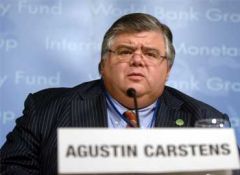 On Saturday Agustin Carstens announced a hands-off approach to the Mexican peso: “A neutral monetary policy is the right stance right now.” In normal times such a statement by a central banker rarely qualifies as news, even to the financial news wires. When conducted by an independent central bank monetary policy is a slow, bland process, involving quarter-point tweaks here and there, and lots of inaction. But these are abnormal times, and the manufacture of monetary policy is proving more difficult.
On Saturday Agustin Carstens announced a hands-off approach to the Mexican peso: “A neutral monetary policy is the right stance right now.” In normal times such a statement by a central banker rarely qualifies as news, even to the financial news wires. When conducted by an independent central bank monetary policy is a slow, bland process, involving quarter-point tweaks here and there, and lots of inaction. But these are abnormal times, and the manufacture of monetary policy is proving more difficult.
Instead of weighing unemployment against inflation, many central banks now have to contend with persistent foreign economic problems: Will the euro zone slowly unwind? Is America re-entering a recession? Handling that third variable is making monetary management more complex. As any street performer can attest: keeping two balls in the air is a parlor trick; three balls in the air is bona fide juggling.
The IMF’s most recent World Economic Outlook states that risks to growth “are clearly on the downside.” Concerning the outlook, Carstens told Reuters Insider that a global slowdown may be on the horizon, but it will be caused more by debt troubles in the euro zone than a recession in the United States. Although Mexico relies on the US for 80 percent of its exports, its economic fundamentals are otherwise sound: annual inflation to mid-September is 3.16 percent, still below the central bank’s ceiling, and revised GDP for 2011 is still at 4 percent.
Other major economies in Latin America aren’t fairing so well. Inflation is getting out of hand in Argentina (though by Argentine standards its still low). In Brazil, after a yearlong battle to rein in the overvalued real, the currency has dropped by 14 percent against the dollar this month, stoking worries of capital flight. By comparison, Mexico has more room in which it can choose not to maneuver.